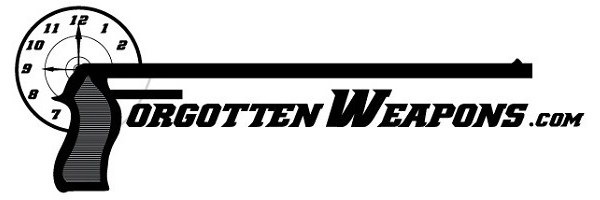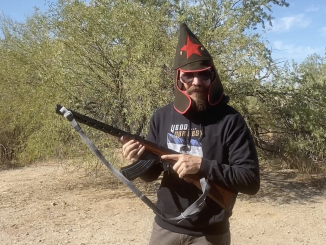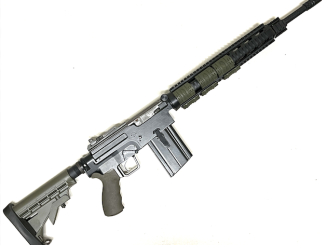From Jon on Patreon:
“Elbonia has been occupied by an enemy force. Do you sabotage their resistance by airdropping them Liberator pistols or Cobray Terminators?”
To my mind, the Liberator is a substantially more useful resistance weapons, so I would supply Elbonia with lots of crates of Cobray Terminators. Why?
First, the Liberator is concealable. Historically, lots of resistance action requires hiding a small weapons. It’s not all forest encampments and ambushes.
Second, the Liberator is more effective. It uses a .45ACP pistol cartridge. The smooth barrel and atrocious sights certainly limit its utility, but if you actually hit someone with it, it will do the job. Most of the shotgun ammunition available to a resistance organization will be the most common sort of sporting ammunition, which is birdshot. Birdshot is very ineffective again people at anything but absolutely point-blank range.
Third, it is much simpler to fabricate a single-shot shotgun than a compact pistol. The Elbonian Resistance wouldn’t have much trouble making something like a Richardson Guerrilla Gun, so supplying them with Terminators doesn’t actually give them much that they couldn’t get already.




How about a Laugo Alien pistol prototype in an obscure cartridge?
Laugo Alien means ridiculously expensive to manufacture.
Prototype meaning that they have not had enough time to de-bug all the feed issues. Obscure cartridge meaning a cartridge that is only made in Elbonia and was never very good to begin with.
I know “Elbonia” is tongue-in-cheek, but come on. Foreign resistance fighters will be able to get a US-centric autopistol cartridge, but not buckshot or slugs for ubiquitous, “sporting” 12G? Also, shotshells are much easier to reload without real equipment (or even real consumables).
And what range would you recommend for a hard-kicking smoothbore derringer?
The Liberator itself was an overcomplicated flex by a surging industry for a cash-flush government, but there’s nothing inherently complex about building a single-shot pistol for contact range (especially given the much lower bolt thrust vs. 12G).
Unless Elbonia has prohibited lead shot like the People’s Republic of Kalifornia, the Elbonians will be able to melt the lead shot in the shotgun shells they can get, and pour the melted lead into molds and make effective buck shot or slugs, which they can reload into the shotgun shells. And they can take the springs and trigger mechanism out of the Cobray and make it a manual slam fire, possibly rendering it more reliable.
Were the Elbonians to be overly supplied w/ Liberators, the brightest among them might realize the possiblity of making at least a smoothbore Grease Gun, and simply request the Liberator shipments stop but continue the airdrops of purely .45 ACP ammo instead.
Much worse guns to supply the Elbonian resistance would be early automatics – .30-40 or .30-06 Potato Diggers, Hotchkiss, the CSRG, that idiotic Italian light machinegun of the 2nd WW w/ the attached magazine that swings open to load…
Anything complex & heavy w/ bad ergonomics, preferably in multiple calibers to complicate their logistics – drop the 6.5 Italian ammo w/ the 8mm French guns, and vice versa.
My thoughts exactly! They could even turn birdshot (any metal) into slugs with glue, and/or reload the hulls with just about anything.
“(…)turn birdshot (any metal) into slugs with glue(…)”
According to https://en.wikipedia.org/wiki/Shotgun_slug#Wax_slugs
Great Depression–era shotgun slug design is the wax slug. These were made by hand by cutting the end off a standard birdshot loaded shotshell, shortening the shell very slightly, pouring the lead shot out, and melting paraffin, candle wax, or crayons in a pan on a stovetop, mixing the lead birdshot in the melted wax, and then using a spoon to pour the liquified wax containing part of the birdshot back into the shotshell, all while not overfilling the shotgun shell. Once the shell cooled, the birdshot was now held in a mass by the cooled paraffin, and formed a slug. No roll or fold crimp was required to hold the wax slug in the hull…
Another excellent option – probably what got me thinking along those lines.
Didnt this wax fouled the barrel like crazy ?
Even easier to make a cut shell, but that brings into question what sort of edged weapons the Elbonians might be supplied with – machetes? Smatchets?
By mass of used steel, shotgun would always cost more and use more of raw materials, though can be probably made easier then stampings heavy Liberator.
To be fair, the Liberator came with several.45 cartridges stuffed in the grip. And you really only need one shot to kill someone and take his gun.
Correction… it was Dick Cheney not Donald Rumsfeld who mistook the poor guy for a quail and with a 28g Perazzi. The 3/4 oz. payload was probably his saving grace.
Shotshell reloading can be simplified to the point of not even needing “real” reloading components.
According to an article by Maj. Fidel Ramos in Guns magazine on improvised weapons in the Philippines, the usual method there used black powder from firecrackers (easily purchased around Chinese New Year), the tips of “Blue Tip” wooden matches for priming, and cut-up bits of nails for the “shot”. Cotton wadding completed the reload, with the crimp redone with a paper disc secured with cooked-rice glue.
According to WW2 U.S. Navy accounts, the preferred ammunition requested by the Philippine resistance to be delivered by submarine was .45 ACP, .38 S&W, and .30-06 because there were a lot of arms in those calibers already in-country before the Japanese invaded. 12-gauge ammunition was also requested, but one 12-gauge round took up as much space as two .30-06 or a half-dozen .38 or .45 in the cases loaded through a fleet boat’s torpedo loading hatches (larger than the personnel scuttles).
As for improvised weapons, besides the “Richardson” slamfire shotgun, improvised pistols can be made easily enough out of Schedule 80 steel pipe of the proper sizes. An improvised “rifle” (actually smoothbore) can be made in .30 caliber if you’re brave or crazy enough.
The weapon every Philippine guerilla really wanted was an M1 Carbine. Lightweight, compact, and the ammunition was light and compact as well. A crate of ten carbines plus accoutrements and a crate of 1,000 rounds of .30 carbine ammunition (110-grain FMJ) was a guerrilla’s dream and every Japanese officer’s nightmare.
It also made the sub crew who delivered same happier; they were easier to get into and out of the boat.
cheers
eon
A slamfire .45 pistol or carbine would work; the Liberator was smoothbore anyway.
Having proved the concept, bundle 3 or 4 .45 caliber pipes together (soldering would be nice, but wrapping with baling wire will do, said the Wyoming dry farmer) and contain them in a larger pipe, loose enough to allow them to slide of course. The larger pipe ends in a welded breechblock studded with fixed firing pins. A machine screw poking through the wall of the large pipe keeps the bundle of barrels correctly orientated to the pins. Slam! and send a swarm of .45 slugs into a file of occupiers! Quickly loot them of guns and wristwatches and cigarettes, and it’s off to the black market to sell the goods to the REAL Resistance. Remember: war is a supplier of commodities, and fortune favors the sneaky.
Uh, don’t you need to hide the bodies of your intended victims BEFORE setting off to the black market?
Slamfire sort of requires a rim, so .45 or 9mm is probably out.
The one described in the old CIA Improvised Weapon book required some wood and a rubber band in addition to the pipe;
http://cdn.preterhuman.net/texts/wars_and_weapons/other/ImprovisedFirearms/14_ImprovisedFirearms.htm
They’ve shown up worldwide ever since.
cheers
eon
It requires headspace. Having to ream a chamber would detract somewhat from the simplicity of a gun built from two pieces of common tubing, but there’s no reason it wouldn’t work. A simple straightwall pistol chamber could be roughed in with a common commercial reamer.
Unless you go to an extreme improvisation on putting circlip on end of the rimless case, then a bore of diameter of case could be used, thus losing a lot of pressure and gas flowing past bullet.
“Liberators or Cobray Terminators for the Elbonian Resistance?” – No. Surplus or used AKs and makarovs with ammo.
Assuming those guys aren’t dumb enough to keep itchy fingers on triggers during a reloading cycle, your idea might work.
“Surplus or used AKs and makarovs” would only fit the Elbonian mission if they were already badly rusted.
Why not get the best of both worlds ?
In other words, drop them a liberator but that shoots only 12ga, and that disintegrates, due to flimsy stamped steel construction sufficient for .45 but not shell, on first shot.
Cobray Terminator with special attachment for Zip .22s on the grip…